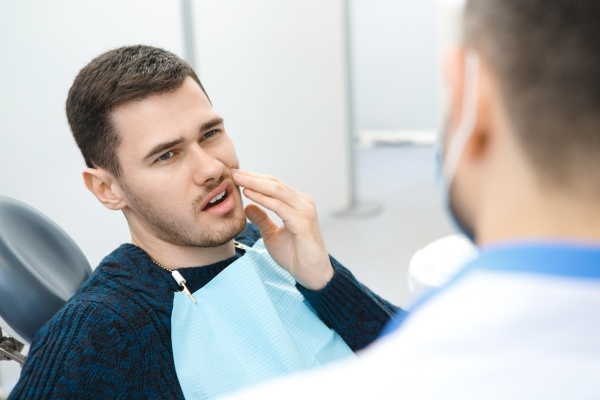What is the Difference Between TMJ and Bruxism?

Patients often confuse TMJ and bruxism, or teeth grinding, with each other. Both are distinct conditions that may actually be related, and both are the cause of discomfort and potentially serious oral health complications.
Understanding bruxism
Bruxism is sometimes simply referred to as teeth grinding and typically happens during sleep, but it may occur at any time. Symptoms may include abnormally worn or chipped teeth, sensitivity due to enamel erosion and a sensation of tension or pain in the jaw and ear region.
Bruxism has a number of potential causes, although the most common is daytime stress and anxiety. This tension accumulates during the day and is released in the form of teeth grinding. However, it may also be caused by misaligned teeth.
Treatment for bruxism
Once a patient is determined to be suffering from bruxism, a number of treatments may be recommended. The most common is the use of a nightguard. These are comfortable, clear devices fitted to a patient’s front teeth to prevent grinding. It is possible to purchase nightguards in retail outlets, but a dentist can ensure a custom fit for improved results.
There are other potential treatments that may be prescribed along with a nightguard, including stress management, lifestyle changes such as limiting alcohol and caffeine or even prescription medication. However, the use of a nightguard is the most common method used to instantly prevent further damage from teeth grinding.
Understanding TMJ
TMJ is short for temporomandibular joint, but in dentistry, TMJ refers to disorders of this joint. It may also be referred to as TMD, or temporomandibular disorder.
Regardless of the name, it is a serious and painful condition characterized by a range of symptoms. Sufferers may experience pain in the face, jaw and ear region or even the neck and shoulders. It may be difficult to open the mouth widely, and the jaw may lock when doing so. Additional symptoms may include clicking sounds when the jaw is moving, swelling, difficulty chewing, tooth and ear aches or hearing problems.
These are serious symptoms that should immediately be checked out by a dentist. Unfortunately, without a dentist’s help, it can be difficult to determine why these symptoms manifest, as TMJ can occur for many reasons. Common ones include bruxism, arthritis, stress or structural problems with the joint. The connection between bruxism and the potential development of TMJ is why the two conditions are often confused.
Treatment for TMJ
If a patient is suffering from TMJ, a dentist will assess the severity of the problem and recommend proper treatment. Treatments may include medications, therapies or surgery.
Medications for TMJ
While pain relievers and anti-inflammatory medications are most common, muscle relaxants may also be used if bruxism is the underlying cause. Tricyclic antidepressants in low doses may also aid in the cessation of grinding.
Therapies for TMJ
Mouthguards are useful if the underlying cause is bruxism, although patients without bruxism may also experience success when using mouthguards. Physical therapy can help strengthen jaw muscles. Counseling may also be suggested to minimize behavioral antagonists of the condition.
Surgeries for TMJ
Surgical intervention is typically only necessary if other methods do not work. Corticosteroid or Botox injections often relieve pain. A procedure called arthrocentesis can help irrigate fluids responsible for inflammation. Surgery on the joint itself is much less common and only occurs as a last resort.
Conclusion
TMJ and bruxism are both serious disorders that may lead to severe oral health problems. Though they may be interrelated, each is distinct, and the only way for a patient to determine whether symptoms are an indication of either condition is by consulting a dentist. To learn more or to schedule an appointment, call our office today.
Request an appointment here: https://www.sacramentosleepdentist.com or call Dental Excellence of Greenhaven at (916) 293-0504 for an appointment in our Sacramento office.
Check out what others are saying about our dental services on Google: TMJ Dentist.
Recent Posts
Getting dental veneers can improve your smile. These thin shells can also protect the treated teeth. Your dentist can determine if you can have this treatment. Here are the details to see if you are a candidate for dental veneers.The enamel can thin out because of sweet and acidic foods and drinks. Hard brushing can…
Dental veneers help patients achieve a picture-perfect smile. However, these wafer-thin shells go over the natural teeth, which begs the question: Are dental veneers comfortable? When installed correctly, veneers feel just like your real teeth. In this article, we will explore veneers, how they work, and how they manage to feel and look natural.Veneers help…
Dental crowns are a common restorative solution that protects damaged teeth, improves appearance, and restores proper function. The placement process follows a common step-by-step restoration. Understanding this process can help alleviate any uncertainty you may have before an upcoming appointment and prepare you for what you can expect. Each stage of the dental crown placement…
Seeing your dentist for dental veneers will start with a consultation. This is the right opportunity to find out more about this treatment. Understanding the process means asking the right questions. Here are three questions to ask your dentist before you get your dental veneers.If the patient chooses temporary veneers, these restorations are not attached…


